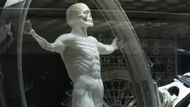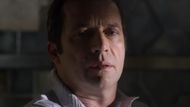What if everything you believed about your world, your home, your memories, even your relationships, was nothing more than a beautifully designed illusion? Science fiction has long been obsessed with the mind-bending concept that our reality might just be a simulation, a perfect lie crafted by unseen hands. And no medium explores this unsettling question quite like TV.
Over the years, some of the most gripping, ambitious sci-fi series have taken audiences on wild rides through realities that glitch, collapse, and reinvent themselves, leaving both characters and viewers scrambling to figure out what's real and what's not.
In Westworld, a show where robots and human fantasies collide, the line between creator and creation blurs dangerously, making us wonder if free will is just another programmed illusion. Meanwhile, Black Mirror brings us chilling visions, exploring the horrors of simulated realities, in episodes like "San Junipero," "Men Against Fire," and "Playtest."
These shows don’t just throw simulations at you for shock value. They force you to live inside them and watch beloved characters fall in love, break down, rebel, and awaken to the crushing truth that their world is not what it seems. The brilliance of these shows lies not just in their futuristic tech or philosophical questions, but in how they make the stakes intensely personal.
Across these 9 sci-fi TV shows, we’ll dive deep into simulated realities both dazzling and terrifying, where freedom is an illusion, choices are scripted, and escape might just be impossible.
9 Sci-fi TV Shows where we get to see a simulation of reality
1. WandaVision (2021)

“But what is grief, if not love persevering?”
When WandaVision first released in January 2021, it felt like Marvel had gone off the rails for a minute, but then fans saw the larger picture. A grieving Wanda Maximoff (Elizabeth Olsen) finds herself living inside a series of increasingly surreal sitcoms, from black-and-white 1950s laugh tracks to garish 2000s mockumentaries. However, something feels very off behind the retro furniture and canned laughter.
Every crack in the perfect suburban life, from the jumpy neighbor Agnes (Kathryn Hahn), who later is revealed to be the sinister Agatha Harkness, the odd behaviors of Vision (Paul Bettany), the creeping dread in moments like Dottie slicing her hand open without noticing, alarmingly hints that this reality isn’t real.
Director Matt Shakman crafts an eerie homage to TV history while slowly unraveling Wanda’s psychic prison, one she unknowingly built, unable to live in a reality where she doesn't get the life she wanted with Vision. Olsen gives a haunting performance as someone holding a dream together with fraying edges. When Vision questions his reality, asking, "What is outside of Westview?" we as viewers collectively hold our breath for the inevitable revelation.
In WandaVision, the simulation is no malevolent machine, but Wanda's love and grief manifested through herself, painting over reality like the brightest strokes of lies.
2. 3 Body Problem (2024)

"The universe is a dark forest. Every civilization is an armed hunter stalking through the trees like a ghost."
Netflix's 3 Body Problem, adapted by David Benioff, D.B. Weiss, and Alexander Woo, is a sprawling, cerebral journey, but the element of simulated reality hits especially hard when we dive into the "Three-Body" virtual reality game.
This intense science fiction series interlinks a watershed moment in 1960s China with the present day, where a group of scientists face a new and unprecedented global challenge, and don high-tech VR headsets to enter a world where entire civilizations live and die under chaotic, unpredictable suns.
The "game" is more than a simulation; it’s a recruitment tool, a puzzle box created by the San-Ti, an alien civilization desperate to find alternative methods of survival, given the extreme nature of the planet they originally inhabited. Inside the simulation, players meet beings like the Commanders, desperately trying to predict the capricious "three suns" and keep their world alive.
The cold, merciless attitude toward these simulated civilizations poses dark, uncomfortable questions, like, if a being can think and feel inside a program, does it matter that it’s "not real"? 3 Body Problem paints simulations not as comforting illusions but as brutal tools for survival, giving existential terror a whole different meaning.
3. Black Mirror (2011)

If you’ve watched even one episode of Black Mirror, you already know that reality is always suspicious in this anthology series. Creator Charlie Brooker builds episodes like intricate little mousetraps, gleaming, promising safety, and then snap!
In the episode "San Junipero," starring Mackenzie Davis and Gugu Mbatha-Raw, we are placed in a pastel, 1980s beach town and witness Yorkie and Kelly (Mbatha-Raw) slowly fall in love. However, we soon discover San Junipero, a digital afterlife, a simulation where consciousness can live on forever.
In "USS Callister", Jesse Plemons' sociopathic coder traps digital clones of his co-workers inside a Star Trek-esque VR game. Black Mirror doesn’t just depict simulations; it dissects them, brutalizes them, and lays them bare at our feet. Every simulated world is a test of morality, and more often than not, nobody passes.
4. Westworld (2016)

When HBO’s Westworld rode onto the scene, it looked like just another sci-fi Western. Robots in cowboy hats, saloon shootouts, and as usual, humans playing god. However, developed by Jonathan Nolan and Lisa Joy, the show quickly showed that this wasn’t just another dystopian sci-fi with robots, but about the very nature of consciousness itself.
"These violent delights have violent ends."
Dolores Abernathy (Evan Rachel Wood), the once-innocent rancher's daughter, slowly awakens to the horrifying realization that her world is a meticulously programmed simulation designed for the entertainment of the "newcomers" (the people playing the game).
Jeffrey Wright’s Bernard Lowe, a park programmer who turns out to be a host himself, delivers a chilling performance and gives us a deeper insight into the mechanism of this strange and violent world. In Westworld, the simulation isn’t an evil plot, but good old-fashioned capitalism. It’s control; the way society categorizes and commodifies human behavior itself. Hauntingly, making it indistinguishable from the "real" world we all think we know.
5. Upload (2020)

Greg Daniels’ Upload, starring Robbie Amell as Nathan Brown and Andy Allo as customer service "angel" Nora Antony, takes a sunnier, more satirical look at simulated realities. But don't let the jokes fool you, as beneath the quirky humor lies a deeper, more unsettling vision.
After Nathan dies unexpectedly, his consciousness is "uploaded" to Lakeview, a luxurious virtual afterlife. He can order room service, go on virtual walks, and even attend virtual funerals. However, Lakeview, like all luxuries, runs on data plans and microtransactions. Want to experience the sunset, or order an extravagant meal? That’ll cost extra.
Upload turns the afterlife into a monetized, corporate app, a place where even death isn't free.
"A universe where to die is to become property and to be created out of a gift of parental DNA is to be doomed to slavery."
Nathan grapples with his loss of freedom by hiding behind humour. And just as you let your guard down, the show yanks the rug from right under your feet, with the revelation that Nathan’s death might not have been an accident after all.
In this candy-colored digital Eden, there’s mold rotting underneath the surface. Reminding us that even in simulations, greed and human corruption follow us like ghosts of our very nature.
6. Altered Carbon (2018)

If Altered Carbon were a drink, it would be an intoxicating cocktail of cyberpunk grit, neon noir, and existential dread. Based on Richard K. Morgan's novel, this Netflix series catapults us 300 years into the future, where death has lost its sting thanks to technology called "stacks", small devices implanted in the spine that store a person's consciousness, making human bodies, or "sleeves," disposable.
Joel Kinnaman plays the brooding Takeshi Kovacs, a soldier-turned-detective who is "resleeved" into new bodies to solve the murder of an immortal tycoon, Laurens Bancroft (James Purefoy).
In this world, the simulation of reality isn't just virtual; it's existential. You could wake up in a new body after centuries, in a world you no longer understand. It's a chilling commentary on a society where identity is fragmented and reality is infinitely customizable, and deeply corruptible. The simulation becomes literal, where entire virtual torture chambers exist, and time can be manipulated infinitely.
Kovacs undergoes brutal mental torture in one such VR, his body regenerating endlessly while his mind is shattered and reassembled. In this show, reality bends, snaps, and reprograms itself with terrifying ease.
7. The Peripheral (2022)

From the mind of William Gibson and showrunners Scott B. Smith and Lisa Joy, The Peripheral gives us a terrifyingly tangible look at simulation and futuristic dystopias. Chloe Grace Moretz stars as Flynne Fisher, a young woman from a struggling small town in 2032 America, who stumbles into a hyper-advanced simulation while beta testing a mysterious VR system, or so she believes. However, it's not just a simulation, but the real London, 70 years in the future.
In an eerie scene, Flynne, wearing her haptic suit, controls a peripheral, a synthetic body in future London. The kicker? The simulation is a portal, not just a dream, with every action taken reverberating through time, altering fates both in the future and the present.
The Peripheral doesn’t just offer cool sci-fi gadgets and sleek, altered realities, but poses the question of whether any version of reality we experience can be truly authentic when power structures are allowed to manipulate entire timelines unchecked.
8. The Midnight Gospel (2020)

Animation often permits creators to go wild, but The Midnight Gospel by Pendleton Ward and Duncan Trussell takes the concept of simulated reality and blasts it into a cosmic, psychedelic dreamscape.
Set inside the Chromatic Ribbon, a colorful, consciousness-hopping multiverse, the show follows Clancy Gilroy, a "spacecaster" who uses a malfunctioning multiverse simulator to visit bizarre worlds on the brink of apocalypse, all to interview its inhabitants for his space podcast.
Each episode unfolds like a fever dream. Clancy could be in a zombie apocalypse, an anthropomorphic dog prison, or attending a clown president's execution. Yet amid all the absurdity, the conversations are piercingly real, exploring themes of death, forgiveness, meditation, addiction, and existential dread.
The show’s loose animation style, where characters morph, worlds collapse, and rules of physics are fairly optional, mirrors the message that reality is as slippery and subjective as a waking dream, or in the case of The Midnight Gospel, a simulation running on a higher-dimensional engine.
9. 1899 (2022)

"May your coffee kick in before reality does."
From the creators of the popular TV series Dark, Baran bo Odar and Jantje Friese, managed to obliterate expectations with the release of the dystopian nightmare series, 1899. Set on the ocean liner Kerberos, this multi-lingual mystery seems, at first, to be about immigrants sailing toward a new life in America. But as the layers peel back, strange symbols, ghostly children, and unexplainable phenomena get hard to ignore and even harder to explain.
Emily Beecham plays Maura Franklin, a doctor with a haunted past, who rises to become the reluctant leader among the passengers aboard the doomed ship. As she pieces together the mystery of the Kerberos, she discovers the mind-bending truth that they are all trapped inside a recurring virtual simulation. A simulation, she might have built herself.
From 19th-century opulence to sterile, futuristic rooms hidden behind trapdoors, 1899 constantly smashes the viewer’s sense of place and time. What seems historical is a programmed illusion. The ocean is a boundary, and the ship, a prison. Reality is just an endless loop until someone breaks it. And like a true simulation story, 1899 ends with more questions than answers, teasing a wider world beyond the known fantasy.
Read more: 10 sci-fi films that ask big questions ft. Blade Runner
